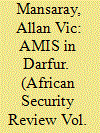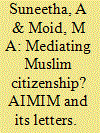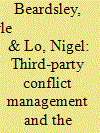|
|
|
Sort Order |
|
|
|
Items / Page
|
|
|
|
|
|
|
| Srl | Item |
| 1 |
ID:
097651


|
|
|
|
|
| Publication |
2009.
|
| Summary/Abstract |
This article studies the Darfur conflict from within the African Union (AU) framework for conflict resolution and peacekeeping and critically examines the operational effectiveness of the AU Mission in Sudan (AMIS).
|
|
|
|
|
|
|
|
|
|
|
|
|
|
|
|
| 2 |
ID:
165251


|
|
|
|
|
| Summary/Abstract |
Many scholars of the Indian State now argue that, given its limited resources and capacities to recognize and service its citizen-subjects, it relies on numerous mediators, including political parties, to administer, govern and rule its populace. The discourse of Indian citizenship meanwhile has moved towards the principle of ethnicity, making Muslim citizenship – as a legal status, a bundle of rights and entitlements, or a sense of identity and belonging (Jayal, 2013, Citizenship and Its Discontents: An Indian History. Ranikhet: Permanent Black, 2) – an increasingly fraught terrain. Located in this theoretical context, our paper examines the political mediation process put in place by the Hyderabad based Muslim political party, the All India Majlis-e-Ittehadul Muslimeen (AIMIM). Drawing on fieldwork at its office, known as Darussalam, during 2010–2011, we argue that this organized mediation is a response to the marginalization of Muslims in the region, which has also evolved to respond to the needs of another marginalized population, Dalits. As such it should be read as a likely form that political representation of the marginalized and Muslims could take in post-colonial India.
|
|
|
|
|
|
|
|
|
|
|
|
|
|
|
|
| 3 |
ID:
128986


|
|
|
|
|
| Publication |
2014.
|
| Summary/Abstract |
Third-party conflict management, particularly legal dispute resolution (arbitration and adjudication) and mediation, can help improve the willingness of disputants to make asymmetric concessions by ameliorating commitment problems and providing political cover. In both regards, and especially pertaining to commitment problems, mediation has substantial limitations when compared to legal dispute resolution. We develop these arguments and test the observable implications on the Issue Correlates of War data. To get traction on the mechanisms at work, we distinguish between challenger concessions and defender concessions, positing that challenger concessions face the primary hurdle of political cover while defender concessions face the primary hurdle of commitment problems. We find that legal dispute resolution strongly increases the propensity for concessions by both challengers and targets, even major asymmetric concessions. Mediation, on the other hand, only helps increase minor challenger concessions. Also consistent with expectations, mediation best enables asymmetric challenger concessions in the highly salient cases that need the most political cover, and legal dispute resolution best enables asymmetric concessions when there has been a history of failed conflict management attempts that perpetuate mistrust.
|
|
|
|
|
|
|
|
|
|
|
|
|
|
|
|
|
|
|
|
|